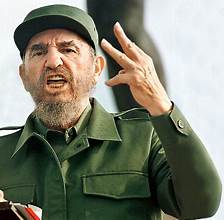
On the date In 1953, Fidel Castro began a revolt against Fulgencio Batista with an unsuccessful attack on an army barracks in Cuba.
Six years later, in 1959, The Castro brothers, with Che Guevara, Camilo Cienfuegos, and Huber Mayos seized power after defeating Batista and transformed my birthplace and island nation into the Western Hemisphere's first communist state.
The real reason why Republicans are bent on re-writing history is that intelligent people learn from mistakes since history keeps repeating itself. When good folks try to predict the future it can be helpful to look at the past and assess the trends.
He was born Fidel Alejandro Castro Ruz born out of wedlock at his father's farm on 13 August 1926. His dad, Ángel Castro y Argiz migrated to Cuba from Spain and became successful in growing sugarcane.
Castro formed a group called "The Movement" which operated along a clandestine cell system, publishing the underground newspaper The Accuser, while arming and training anti-Batista recruits.
From July 1952 they went on a recruitment drive, gaining around 1,200 members in a year, the majority from Havana's poorer districts. Although a revolutionary socialist, Castro avoided an alliance with the communist Popular Socialist Party, fearing it would frighten away political moderates, but had contacts with PSP members like his younger brother Raúl Castro.
Fidel Castro stockpiled weapons for a planned attack on the Moncada Barracks, a military garrison outside Santiago de Cuba, Oriente. Castro's militants intended to dress in army uniforms and arrive at the base on 25 July, seizing control and raiding the armory before reinforcements arrived. Supplied with new weaponry, Castro intended to spark a revolution among Oriente's impoverished cane cutters and promote further uprisings. Castro's plan emulated those of the 19th-century Cuban independence fighters who had raided Spanish barracks; Castro saw himself as the heir to independence leader José Martí.
Over the following days, the rebels were rounded up; some were executed and others—including Castro—were transported to a prison north of Santiago. Believing Castro incapable of planning the attack alone, the government accused Ortodoxo and PSP politicians of involvement, putting 122 defendants on trial on 21 September at the Palace of Justice, Santiago. Acting as his defense counsel, Castro cited Jose Martí as the intellectual author of the attack and convinced the three judges to overrule the army's decision to keep all defendants handcuffed in court, proceeding to argue that the charge with which they were accused—of "organizing an uprising of armed persons against the Constitutional Powers of the State"—was incorrect, for they had risen against Batista, who had unconstitutionally seized power.
The trial ended on 5 October, with the acquittal of most defendants; 55 were sentenced to prison for 13 years. Castro was sentenced on 16 October, during which he delivered a speech that would be printed under the title of History Will Absolve Me Castro was sentenced to 15 years imprisonment in the hospital wing of the Model Prison, a comfortable and modern institution on the Isla de Pinos.
Imprisoned with 25 comrades, Castro renamed his group the "26th of July Movement" in memory of the Moncada attack date, and formed a school for prisoners. He read Marx, Lenin, and Dostoyevsky, analyzing them within a Marxist framework.
If my friends and colleagues were also there and recall correctly, it was the US government who lobbied BATISTA for amnesty along with some Cubans who started a letter-writing campaign. Some politicians suggested an amnesty would be good publicity, and the Cuban Congress agreed. Batista believed Castro to be no threat, and on 15 May 1955, the prisoners were released. Returning to Havana, Castro gave radio interviews and press conferences and fomented the Cuban Revolution. The rest is History.
By the way, Hitler was jailed and released, and we all know how that ended.
Also today, Hillary Clinton was nominated and became the first woman to run for president by a major political party at the Democratic National Convention in Philadelphia... And so it goes,